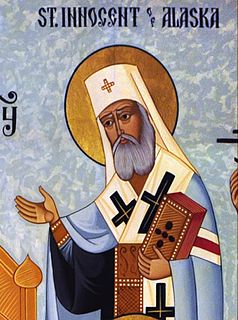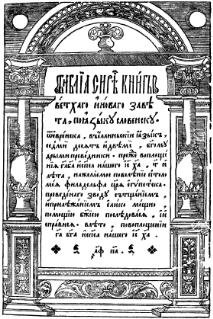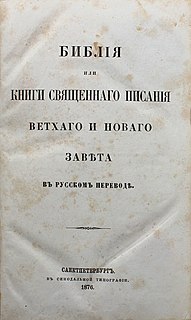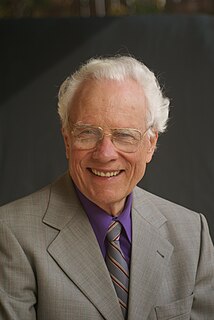
The New World Translation of the Holy Scriptures (NWT) is a translation of the Bible published by the Watch Tower Bible and Tract Society. The New Testament portion was released in 1950, as The New World Translation of the Christian Greek Scriptures, with the complete Bible released in 1961; it is used and distributed by Jehovah's Witnesses. Though it is not the first Bible to be published by the group, it is their first original translation of ancient Classical Hebrew, Koine Greek, and Old Aramaic biblical texts. As of September 2020, the Watch Tower Society has published more than 220 million copies of the New World Translation in whole or in part in 193 languages. Though commentators have said a scholarly effort went into the translation, critics have described it as biased.

August Hermann Francke was a German Lutheran clergyman, theologian, philanthropist, and Biblical scholar.

Biblical inerrancy is the belief that the Bible "is without error or fault in all its teaching"; or, at least, that "Scripture in the original manuscripts does not affirm anything that is contrary to fact". Some equate inerrancy with biblical infallibility; others do not. The belief is of particular significance within parts of evangelicalism, where it is formulated in the "Chicago Statement on Biblical Inerrancy".

Francysk Skaryna was a Ruthenian humanist, physician, and translator. He is known to be one of the first book printers in the Grand Duchy of Lithuania and in all of Eastern Europe, laying the groundwork for the development of the Belarusian izvod of the Church Slavonic language.

The Recovery Version is a modern English translation of the Bible from the original languages, published by Living Stream Ministry. It is the commonly used translation of the local churches.

Saint Innocent of Alaska, also known as Saint Innocent Metropolitan of Moscow was a Russian Orthodox missionary priest, then the first Orthodox bishop and archbishop in the Americas, and finally the Metropolitan of Moscow and all Russia. Remembered for his missionary work, scholarship, and leadership in Alaska and the Russian Far East during the 19th century, he is known for his abilities as a scholar, linguist, and administrator, as well as his great zeal for his work.

The Ostrog Bible was one of the earliest East Slavic translations of the Bible and the first complete printed edition of the Bible in Church Slavonic, published in Ostroh, in the Polish–Lithuanian Commonwealth, by the printer Ivan Fyodorov in 1581 with the assistance of the Ruthenian Prince Konstantin Ostrogski.

Hilarion Alfeyev is a bishop of the Russian Orthodox Church. At present he is the titular Metropolitan of Volokolamsk, the chairman of the Department of External Church Relations and a permanent member of the Holy Synod of the Patriarchate of Moscow. He is also a noted theologian, church historian and composer and has published books on dogmatic theology, patristics and church history as well as numerous compositions for choir and orchestra.

The Russian Synodal Bible is a Russian non-Church Slavonic translation of the Bible commonly used by the Russian Orthodox Church, Russian Baptists and other Protestant as well as Roman Catholic communities in Russia.
Ukrainian Bible Society, is a religious non-profit organization, established by representatives of different Christian denominations in Ukraine, who recognize the Bible as the Word of God. It is a member of the international association of United Bible Societies, which currently involves 145 national institutions of similar kind.
The Bible Society in Russia is a Christian non-denominational organization for translating and distributing the Bible in Russia, in languages and formats accessible to anyone.
Andrey Andreyevich Kistyakovsky was a Russian translator and political activist. He translated belles-lettres and poetry from English to Russian and began publishing in 1967.

The Elizabeth Bible is the authorized version of the Bible used by the Russian Orthodox Church. The Elizabeth Bible was the third complete printed edition of the Bible in Church Slavonic, published in Russia in 1751 under and with the assistance of the Russian Empress Elizabeth.

Daria Andreyevna Khaltourina is a Russian sociologist, anthropologist, demographer, and a public figure. She is the head of the Group of the Monitoring of Global and Regional Risks of the Russian Academy of Sciences, co-chairperson of the Russian Coalition for Alcohol Control, as well as the Russian Coalition for Tobacco Control. She is a laureate of the Russian Science Support Foundation Award in "The Best Economists of the Russian Academy of Sciences" nomination (2006).
Traditionally Russia used the Old Church Slavonic language and Slavonic Bible, and in the modern era Bible translations into Russian. The minority languages of Russia usually have a much more recent history, many of them having been commissioned or updated by the Institute for Bible Translation.

Mikhail Petrovich Kulakov was a Russian adventist pastor, social and religious activist, and Protestant Bible scholar and translator. He was co-founder of the Russian Branch of the International Association for Religious Freedom (1992), founder of the Institute for Bible Translation in Zaoksky, an honorary board member of the Russian Bible Society, and the head of the Church of Seventh-day Adventists in the Soviet Union (1990—1992). Kulakov's work on translating the Bible into modern Russian language has been lauded by biblical scholars, philologists, theologians and various representatives of Orthodox and Protestant churches in Russia.

Sergei A. Alexandrovsky is a Russian poet and translator.

Kórmchaia Book, pl. Kórmchiye Books or Books of the Pilot or Pidalion or Nomocanon are collections of church and secular law, which constituted guide books for the management of the church and for the church court of Orthodox Slavic countries and are transmission of several old texts. It were written in Old Church Slavonic and Old Russian.

Merílo Právednoye or Just Measure is Old Russian legal collection of the end of the 13th or the beginning of the 14th century, preserved in the copies of the 14th to the 16th centuries. The name was given in the modern literature, it was taken from the first words of this text: "this books is just measure, true weighing...". Just Measure was written in Old Church Slavonic and Old Russian.

Metropolitan Eugene is a bishop of the Russian Orthodox Church, Metropolitan of Tallinn and All Estonia and primate of the Estonian Orthodox Church of the Moscow Patriarchate, former rector of Moscow Theological Academy (1995-2018) and Chairman of the Educational Committee of the Holy Synod (1994-2018).
















